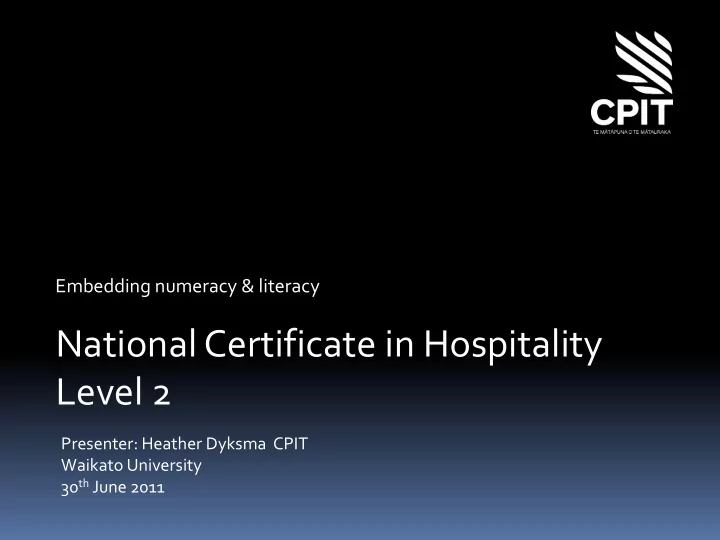

Embedding numeracy & literacy National Certificate in Hospitality Level 2 Presenter: Heather Dyksma CPIT Waikato University 30 th June 2011
2011 recipient of CPIT Teaching excellence award -team ‘Embedding numeracy and literacy ’
Hospitality Level 2 Course Contents Introduction to Cookery Barista training Restaurant Service Bar Service Customer Service Read Text Hospitality Industry Workplace Calculations Workplace literacy Maintain a responsible drinking environment Run the Barista competition
Student profile 16 / 17 years Early school leavers Disengaged from school system Lost confidence Need to keep active Often have social or family difficulties Quick learners Peer conscious
Knowing our learner Interview Information evening Orientation – introduce LN advisor early Attitude to writing survey ALNAT – with LN Advisor and tutor
What we did Numeracy & literacy part of all Restaurant , Wine & Bar programmes Learning for Living Words Add Up LLN Advisor TEC requirements 22 weeks – 34 weeks
Lesson Plan Warm up - 24 hour clock exercises Objective: Familiarise students with timetable format & 24 hour clock Time Topic Resource 20 Hand out timetables Whiteboard Write up samples of different times: ie Slips of paper 1500 Timetable 2750 samples 1340 0700 Ask students in pairs to translate into universal time. Give each pair a slip of paper & marker. Ask one person from each pair to show their method for translating times. Write up on whiteboard demonstrate there are many different ways to work out times, one is not better than the other. 20 Task 1 Flash cards Test students speed using timers Timers Card game. Hard copy of In pairs sample Allow students 60 seconds to match cards (play snap or memory timetable, cover game) 3-4 weeks Task 2 or Using timetable as a reference ask students (in pairs or Book computer individually) to complete exercises 1-8 on handout . suite ‘ Using your timetable’ Set of coloured Task 3 cards ‘Continuum ‘ give each student a card with a time written on it, muddle 24 hour clock times with universal times and ask students to form a continuum starting with earliest time of day through to latest.
Link up to your career – Linu 100 Tourist project Commercial laundry visit Conversation with International students CV writing Job applications Formal Interview – written feedback Gen Y debate Menu terms and definitions Language Lab
Raspberry Coulis Coo lee Sweet sauce made from Raspberries Tuille Too ill Delicate crisp sweet biscuit, slightly curved Biscotti Bis cot tee Italian Small hard crunchy “double baked” biscuit
How do we know it’s working? ALNAT results 2010 Tell us they are trying new things We know because the students start asking questions Start getting things right Get into the habit of analysing things they don’t know Show an interest where they previously did not Employment Attendance High level behaviour
Raise responsibility system Dr Marvin Marshall www.MarvinMarshall.com
High level behaviour is actually all about personal motivation D Democracy C Cooperation B Bullying Bossing A Anarchy Conformity Develops self Bosses others Absence of order discipline Considerate Bothers others Aimless & chaotic Demonstrates Co operates initiative Bullies others Complies Displays Breaks rules responsibility Conforms Does good because it’s the right thing to do How am I doing? D C ________ B A
Getting to class on time – setting the alarm clock Level D - You set your alarm clock, wake up, and get to school on time. Level C - You depend on your parents to wake you up so you get to school on time. Level B - You ignore the alarm clock and come to school late. Level A - You don't even set your alarm clock because you are only interested in what you want and do not consider how your actions affect others. Their motivation must come from within.
Student’s tourism exercise
Hospitality Industry Numeracy Literacy
Recommend
More recommend